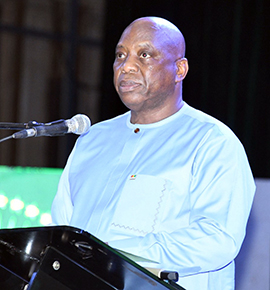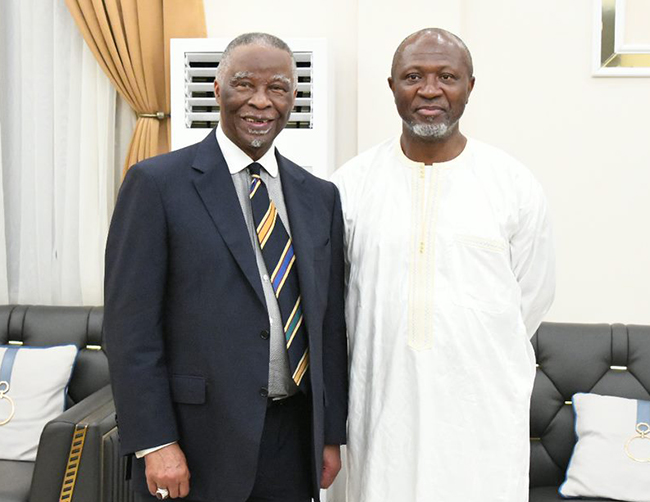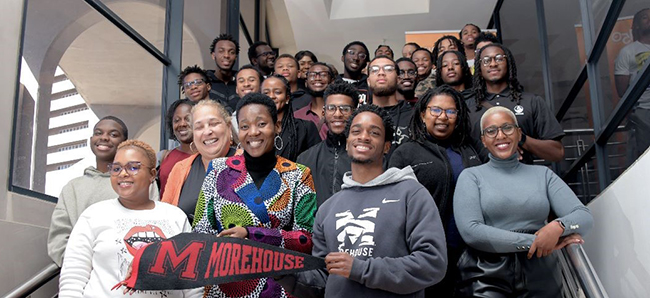News & Events
Republic of Guinea hosts 13th Thabo Mbeki Africa Day Lecture

Dr Morissanda Kouyaté
The Thabo Mbeki Africa Day Lecture is a significant event that showcases the Thabo Mbeki Foundation (TMF) and Unisa's commitment to the African continent. Since its establishment, TMF and Unisa have honoured the call made by African political leaders in 1963 to use 25 May to advance the continent's goals. This tradition remains steadfast even after the African Liberation Day was renamed Africa Day.
On Saturday, 27 May 2023, the 13th Thabo Mbeki Africa Day Lecture took place in the City of Conakry, Republic of Guinea. Interestingly, this marked the first time the lecture was held outside South Africa.
In his welcoming address, Dr Morissanda Kouyaté, Republic of Guinea’s Minister of Foreign Affairs, expressed his gratitude that Unisa and TMF had selected his country to host the lecture. He conveyed the Guinean government's delight on the prestigious occasion.
Unisa Chancellor, former President Dr Thabo Mbeki, introduced the distinguished 2023 keynote speaker, Professor Siba N'Zatioula Grovogui. Grovogui is an expert in international relations and political thought and the Director of Graduate Studies at Cornell University’s Africana Studies and Research Center in Ithaca, New York.

Unisa Chancellor, Dr Thabo Mbeki and keynote speaker, Prof Siba N'Zatioula Grovogui
Mbeki commended Grovogui as an exceptional African scholar, emphasising that the choice of the lecture’s speaker is grounded in their intellectual capacity, dedication to Pan-Africanism, and their integrity. He affirmed that Grovogui embodies these qualities.
Grovogui began by delving into Africa's histories and archives, then into the core of his presentation. He stated: “I am proud to be among the firsts. I recall that I have always been among the firsts to live on the land where it all began – Africa.”
He provocatively asked: “If we (Africans) were the first, you might ask why it seems like we are the last today?” He added: “A good deal of it has to do with how we understand ourselves today.”
Additionally, Grovogui remarked: “I am here today to look inward and call to attention greater threats ahead than before, and that these threats are related to the inequalities of the structure, mechanisms, and processes of the world of nations, states, capital, and cultures.”
Grovogui went further to list some of the threats that lie ahead:
First, is the symbolic shrinking of Africa, that is, the erasure of Africa and Africans on the continent, and the descended diasporas from the operative knowledge systems and their algorithms of life forms and requirements: physical, biological and psychic needs.
The second field is political theory. This is essentially a mental journey through time of the archives, canons and human events leading to the ascension of Europe and the West. This is a trajectory pitched by the European Renaissance as originating in ancient Greece and Rome, which provided Europe with the sciences, technologies and morals to lead the world toward progress. It is a story that has as much validity as it does falsehood. The falsehood resides in the exclusivity of the Europeanness of ancient Greece and Rome. These entities are not only inseparable in Africa.
The third is international relations. Its role is to give the impression that it is ethically coherent to treat human beings differently based on imperial needs, geography, race, culture and religion.
The last field of political science is comparative politics. Grovogui posits that most Africans studying political science are oriented toward fixed understandings of the world. They are not told in political theory that the authors whose ideas now form Western canons, were directly conversing with Africans.
Further, Grovogui highlighted areas of thought and action where Africans led in the past:
- Gamal Abdel Nasser put an end to the imperial fantasy that Africans bore no relations to their environment that was constitutive of property.
- Under instructions from Sekou Touré, Kwame Nkrumah provided the right to self-determination the meaning that it has today.
- The governments of Ethiopia and Liberia challenged the idea that the expansion of international society had no incidence for international law.
- Julius Nyerere put an end to Idi Amin’s reign long before the principle of responsibility to protect, was adopted by the United Nations.
- Alpha Omar Konaré attained peace in Mali through internal negotiations and moral schemes of liveable futures.
For Grovogui, there is a lot of social, moral, scientific and institutional experimentation on the African continent to inspire its citizens, cause them to reject dictatorship, and embrace science and methodical rigour. “Also,” he continued, “if we knew our history, our collective psyche would not have accommodated much that is wrong in Africa.”

Prof Edith Phaswana
For Africa to transcend its challenges, Grovogui concluded his lecture by proposing a formation that is independent of states, businesses, universities, research centres, professional organisations and others that stand to assist all of them – state and local government, industry and business, researchers, and teachers in their specific pursuits.
He explained: “This would be an institution to point to our collective temporal, moral and social horizons, to orient investments, galvanise research, support creativity, set standards for universities, and assist artists and craftspeople. It would gather Africans for concrete proposals in all dimensions of life across the continent.”
Responding to the lecture, Professor Edith Phaswana, Director of Graduate Academic Programmes at the Thabo Mbeki African School of Public and International Affairs (TM-School), remarked that aspects of the lecture resonated with the ideals of the TM-School. She acknowledged that Grovogui underscored the need for a truly African university and not a ‘university in Africa’.
Phaswana further said: “The lecture challenges us to question what our locus of enunciation as Africans is, and where we are speaking from.”
You can watch the recording of the lecture on YouTube or Facebook.
#Unisa150
* By Tshepo Neito, Marketing and Communication Specialist, Thabo Mbeki African School of Public and International Affairs
Publish date: 2023/06/01
